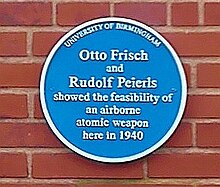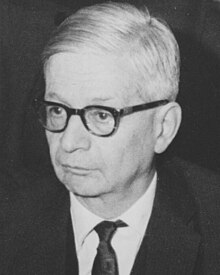Rudolf Peierls
Sir Rudolph Ernst Peierls (born June 5, 1907 in Berlin ; † September 19, 1995 in Oxford ) was a German - British physicist .
life and work
Peierls comes from an upper class assimilated Jewish family in Berlin. He studied physics at the Friedrich Wilhelms University in Berlin, from 1926 at the University of Munich under Arnold Sommerfeld and in 1928 under Werner Heisenberg in Leipzig , where he received his doctorate. In 1929 he was assistant to Wolfgang Pauli in Zurich . Here and in Leipzig today Peierls created classic works on solid state physics , partly in collaboration with Felix Bloch , who also worked at Heisenberg in Leipzig.
After completing his studies, Peierls initially worked in various fields of solid state physics and semiconductor physics , applying the new ideas of developing quantum mechanics to these questions. He first described the flipping process and published fundamental work on the behavior of electrons in metals, where he also discovered the hole conduction of positive charge carriers in semiconductors. Many of his ideas at the time flowed into the "solid-state canon" or were even rediscovered later (such as the Brillouin zone ). Together with Niels Bohr and Georg Placzek , he formulated the optical theorem (Bohr-Peierls-Placzek theorem) in 1939 . In addition to nuclear reactions, he was also concerned with other areas of nuclear physics such as collective excitations in nuclei and quantum field theory .
At the time of the seizure of power in 1933 he was in Cambridge on a Rockefeller scholarship and decided not to return to Germany in view of the political events. At first he worked together with other emigrants (including Hans Bethe ) under Lawrence Bragg in Manchester with James Chadwick on problems from the statistical thermodynamics of alloys. He was supported by an aid fund for German refugees. He later took a job at Cambridge and worked on superconductivity , superfluids, and problems in nuclear physics. In 1937 he received a professorship at the University of Birmingham , where he built up his own school of theoretical physics in the course of the following decades.

Concerned about the apparent progress of atomic research in Germany and about the possibility of building he wrote a bomb in Hitler's Germany in 1940 together with the Austrian emigrants Otto Frisch , a pioneer of nuclear fission, who also worked in Birmingham, the later so-called fresh-Peierls Memorandum in which there was an urgent warning against the construction of an atomic bomb in National Socialist Germany and which called for more research into the construction of a British atomic bomb. They specified 1 kg as the critical mass for a uranium-235 bomb, far below the estimates otherwise circulating at the time. In particular, they showed that building an atom bomb was in principle within the realm of what was possible at the time. Via the MAUD report, her memorandum also reached the USA in 1941, where it influenced the beginning of the Manhattan Project , on which Peierls worked from 1943 after he had obtained British citizenship (e.g. from work on the war-important British Like Frisch, he had previously been excluded from radar because he was not a British citizen). The fact that he also brought Klaus Fuchs , who was later exposed as a Soviet spy, to the Manhattan Project later made him suspicious of official agencies in the USA.
After the war he was back at the University of Birmingham and from 1963 at the University of Oxford , and was also an advisor to the British nuclear program in Harwell , but also campaigned for disarmament early on and was active in the Pugwash movement . He retired in 1974 but lectured at the University of Washington for three years .
Peierls had been married to the Russian physicist Evgenia Nikolajewna Kanegiser since 1931 and had three daughters and a son with her. He met his wife at a conference in Odessa in 1930 and married her a year later while staying in Leningrad .
Honors
In 1945 he was elected as a member (" Fellow ") in the Royal Society , which awarded him the Royal Medal in 1959 and the Copley Medal in 1986 . In 1946 he was named Commander of the Order of the British Empire , and in 1968 he was promoted to a Knight Bachelor degree . In 1962 he received the Lorentz Medal, in 1963 the Max Planck Medal and in 1980 the Enrico Fermi Prize . In 1962 he was elected to the American Academy of Arts and Sciences , in 1970 to the National Academy of Sciences , in 1981 a member of the Leopoldina and 1984 a foreign member of the Académie des Sciences .
See also
Fonts
- with Niels Bohr, G. Placzek: Nuclear reactions in the continuous energy region . In: Nature . tape 144 , July 29, 1939, pp. 200-201 , doi : 10.1038 / 144200a0 .
- Recollections of Early Solid State Physics . In: Proceedings of the Royal Society of London. A. Mathematical and Physical Sciences . tape 371 , no. 1744 , October 6, 1980, p. 28-38 , doi : 10.1098 / rspa.1980.0053 .
- Bird of Passage: Recollections of a Physicist . Princeton University Press, 1985, ISBN 0-691-08390-8 .
- Atomic Histories . American Institute of Physics, 1996, ISBN 1-56396-243-8 .
- Quantum Theory of Solids . Oxford, Clarendon Press 1955, 2004.
- The Laws of Nature . Allen & Unwin, London 1955.
- Surprises in Theoretical Physics . Princeton University Press, 1979.
- More Surprises in Theoretical Physics . Princeton University Press, 1991.
- Selected Scientific Papers of Sir Rudolf Peierls . World Scientific, 1996 (with commentary, editor Dalitz).
- Selected private and scientific correspondence . World Scientific, 2007
literature
- Horst Kant : Peierls, Sir Rudolf Ernst. In: New German Biography (NDB). Volume 20, Duncker & Humblot, Berlin 2001, ISBN 3-428-00201-6 , pp. 160 f. ( Digitized version ).
Web links
- John J. O'Connor, Edmund F. Robertson : Rudolf Peierls. In: MacTutor History of Mathematics archive .
- Biographical information
Individual evidence
- ↑ Oral History Interview with Peierls 1989
- ↑ That expressed itself e.g. For example, the delay in issuing visas for the United States to attend various conferences (New York Times, Obituary, September 22, 1995). In 1995 an article appeared in the English “Spectator” that suspected him of being a Soviet spy, which at the time sparked violent protests among Peierl's family.
- ↑ entry on Peierls; Sir; Rudolf Ernst (1907-1995) in the archive of the Royal Society , London
- ↑ Member entry of Rudolf Peierls at the German Academy of Natural Scientists Leopoldina , accessed on January 17, 2016.
| personal data | |
|---|---|
| SURNAME | Peierls, Rudolf |
| ALTERNATIVE NAMES | Peierls, Rudolph Ernst |
| BRIEF DESCRIPTION | German-British physicist |
| DATE OF BIRTH | June 5, 1907 |
| PLACE OF BIRTH | Berlin |
| DATE OF DEATH | September 19, 1995 |
| Place of death | Oxford |

